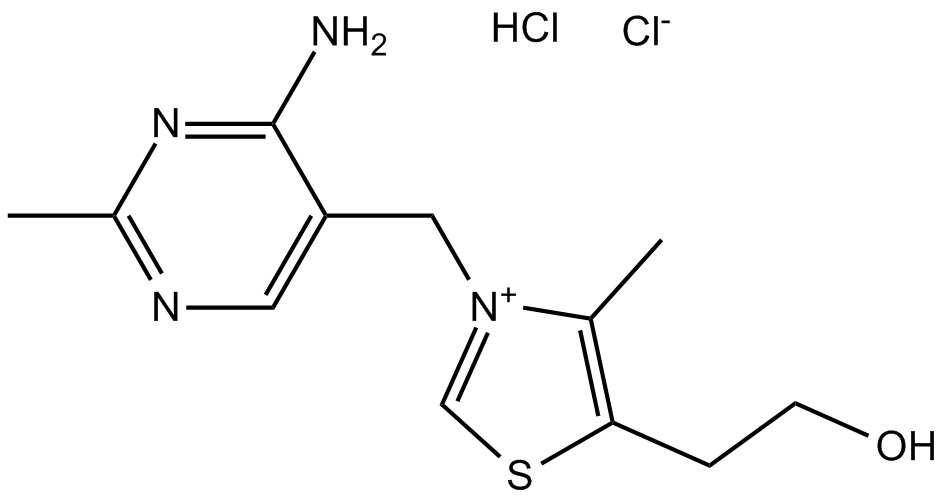 What is Vitamin B1 Thiamine Hydrochloride?
What is Vitamin B1 Thiamine Hydrochloride?
Thiamine Hydrochloride, is the one form of Vitamin B1. It is composed of a pyrimidine ring and a thiazole ring, it is a water-soluble vitamin that belongs to the vitamin B family and is one of the 13 essential vitamins that the body needs.We are a experienced supplier of vitamin B1 (Thiamine Hydrochloride and Thiamine mononitrate) – Vitamin B1 is mainly found in the skin and germ of the seeds, such as rice bran and bran, which are abundant in yeast and very abundant in yeast. Lean meat, cabbage and celery are also rich in content.
The currently used vitamin B1 is chemically synthesized. In the body, vitamin B1 participates in the catabolism of sugars in the form of coenzymes and has a protective effect on the nervous system. It also promotes gastrointestinal motility and increases appetite. It is widely used in food and feed industry as a supplement.
CHEMICAL NAME: 6H-Purin-6-one, 2-amino-1, 9-dihydro-9-[(2-hydroxyethoxy) methyl]-9-[(2-Hydroxyethoxy)methyl]guanine
CAS NO.:67-03-8
MOLECULAR FORMULA: C12H17ClN4OS•HCl
MOLECULAR WEIGHT: 337.27
Properties
Thiamine Hydrochloride is a white crystalline or crystalline powder; there is a slight special odor, bitter taste, and a wet primer, easily absorbing moisture when exposed to the air. It is easy to decompose and deteriorate in alkaline solution. The pH can withstand high temperatures of 100°C at 3.5 and pH 5 is more likely to fail. The light and heat valence decreased. It should be stored in shading, cool place, should not be stored for a long time. It is stable in acidic solution, unstable in alkaline solution, easily oxidized and destroyed by heat.
Appearance: White crystals or crystalline powder
Melting point: 248 ℃
Solubility: Thiamine Hydrochloride is freely soluble in water and soluble in glycerol and slightly soluble in alcohol. ThiamineHydrochloride is used as a food additive and can be found in meat, milk, vegetables and whole grains.When exposed to air, the anhydrous product rapidly absorbs about 4% water.
Function and benefits
Participate in nutrient metabolism function
Vitamin B1 is a water-soluble vitamin essential for the maintenance of animal growth. It is mainly involved in the metabolism of sugars and some amino acids in the body. It is catalyzed by specific enzymes and can interact with ATP to form thiamine pyrophosphate (TPP). TPP is an important coenzyme for glucose metabolism. Therefore, when vitamin B1 is deficient, glucose metabolism is hindered.
On the one hand, the lack of energy supply to the nervous tissue results in the lack of multiple neuroinflammation, which can easily lead to changes in heart organ properties and changes in cardiac function; on the other hand, disturbance of glucose metabolism in the body, the production of pyruvic acid and lactic acid in blood and tissue sugar metabolism, both of which accumulate in blood, urine, and tissues can cause acidosis.
Sugar metabolism can affect lipid metabolism. If vitamin B1 is lacking and lipid synthesis is reduced, the integrity of myelin cannot be maintained, resulting in neurological lesions and multiple neuritis. Vitamin B1 deficiency can also lead to impaired cholesterol synthesis due to a decrease in 3-hydroxy-3-methylglutaryl coenzyme A reductase activity, a key regulatory enzyme. Cholesterol is also one of the main components of cell membranes, and its synthesis barriers can affect the integrity of the nerve cell membrane.
Other functions
The lack of vitamin B1 can reduce the level of vitamin B1 in the brain and affect brain function. Adult mice were fed a diet lacking vitamin B1 for a short period of time (24 days) and were subjected to the platform-sweeping, dark-dwelling, and water-maze tests. The error rate was significantly higher than that of feeding normal diets.
Rats fed a diet lacking vitamin B1 also showed a loss of passive avoidance response and vitamin B1 recovery. The study also found that vitamin B1 has a direct neurochemical activity on the central nervous system and can interact with Ca2+ and Mg2+ to regulate the release of neurotransmitters from the presynaptic membrane.
The relationship between vitamin B1 and cardiac function is also very close. Experiments have shown that short-term lack of vitamin B1 animals, the heart muscle tension and elasticity greatly reduced, abnormal heart rate, vitamin B1 supplement can still recover. However, if there is a long-term lack of vitamin B1, severe heart damage can eventually lead to death.
Deficiency of vitamin B1 hcl in feed
As animals can not store thiamine, so Thiamine Hydrochloride can only be fed from the feed. When the animal lacks green feed for a long time and the cereal feed is insufficient, such as sow lactation, pregnancy, piglet growth and development, chronic wasting disease and fever, there is relative shortage or lack of supply. Secondary is due to the presence of substances that interfere with thiamine, such as chronic diarrhea.
Affected pigs showed poor energy at the beginning, poor appetite, slow growth or stagnation, rough coats, awkwardness, walking and shaking, ataxia, hindlimb claudication, and edema of the orbit, submandibular, hypothalamus, and hindlimb, and weakness. Bradycardia, cardiac hypertrophy; late skin mucous membranes, fever, decreased body temperature, hyperthyroidism, respiratory compulsions, and eventually died of weakness. Slow onset, duration up to 7-10 days. Piglets are clinically more than pigs.
Application and Use
Thiamine Hydrochloride is a white crystalline powder with a faint characteristic yeast/nut-like odor and a bitter taste. It is used to enhance the flavor of foods, including gravies and broths, and can be used as a functional food additive to increase vitamin B1.
What is Vitamin B1 Thiamine Hydrochloride used for?
It used to fortify foods as a supplement in food and feed. Thiamine Hydrochloride is an essential vitamin that helps prevent various health problems, including heart damage. This product is commonly used for general food fortification and dietary supplements. It can be used in solid and liquid formulations.
In food
Thiamine mononitrate is a water-soluble vitamin that is naturally found in grains, yeast, and animal organ meat. It can be used in food as a vitamin B1 source supplement.
In feed
Application in Aquatic
Due to the extensive role of vitamin B1 in aquatic animals, the chronic shortage of vitamin B1 not only affects its growth, but also causes a series of deficiencies due to metabolic reactions in the body. A stufy found that shrimps, crabs, and other crustaceans cannot synthesize vitamin B1 or have a very small amount of synthetic vitamin B1. They are difficult to satisfy their physiological needs and must be obtained through artificial feeding. A research in Chinese shrimps for promoting glucose metabolism and found that it is necessary to ensure that the vitamin B1 diet is 60 mg/kg in order to make full use of the sugar source in the diet.
In Poultry
Vitamin B1 also plays an important role in the growth of poultry. A study found that adding thiamine above 1.0 mg/kg in diets significantly increased the body weight gain of broilers at 3 weeks and 4 to 7 weeks (P<0.01). The requirements for broilers at 3 weeks of age and 4 to 7 weeks of age were 4.0 mg/kg and 1.6 mg/kg, respectively. It can therefore be demonstrated that vitamin B1 is essential in poultry feed formulations.
In Ruminants
Vitamin B1 has a special nutritional effect on ruminants. A study found that during the peak period of lactation, cows are prone to eating milk, resulting in decreased milk production. They can be injected intramuscularly with 0.25% of vitamin B130mL, and the second day after light injection, the cow begins to eat. Material, severe cases need to go back to normal after 2 or 3 doses. A study found that Wernicke’s encephalopathy is due to prolonged fasting, resulting in the onset of thiamine deficiency, mainly through vitamin B1 treatment, if diagnosed promptly, can be restored after treatment. In addition, vitamin B1 is a specific drug in the treatment of bovine ketone disease and horse myoglobinuria, and is widely used in organic phosphorus poisoning, food poisoning and drug poisoning.
Side effects
Is Thiamine Hydrochloride good for you?
As a safe food and feed additive, Thiamine Hydrochloride is generally recognized as a safe Vitamin and good for people and poultry, but there maybe some side effects:
- blue colored lips;
- chest pain, feeling short of breath;
- black, bloody, or tarry stools; or
- coughing up blood or vomit that looks like coffee grounds.
Market
Manufacturers and price
The world’s major manufacturers and suppliers of vitamin B1 (Thiamine mononitrate and Thiamine hydrochloride) include Tianxin, Huazhong, Brother and DSM, which account for 97% of globalvitamin B1 production capacity. In 2016, the global output of vitamin B1 (Thiamine mononitrate and Thiamine hydrochloride) was about 7,530 tons, and the production of China was 6,530 tons, which occupies an absolutely dominant position.
Among these manufacturers, the production capacity of the Brother was 3,200 tons, and the output is about 1400 tons, which accounts for 21% of the total China production. In 2016, the export volume of China’s vitamin B1 was about 5510 tons, and its export share had not changed much over the years. The main players in China are Tianxin, Huazhong and Brother.
In 2007, there were around 10 manufacturers of vitamin B1 (Thiamine mononitrate and Thiamine hydrochloride) in China. In the past five years, the market was stable. The only three major manufacturers in China market, Tianxin, Huazhong and Brother, accounted for 87% of the global market share.
Vitamin B1 Thiamine Hydrochloride is widely used as feed additives (37%), cosmetics (51%) and food (12%). Vitamin B1 is necessary feed, food, and pharmaceutical health products. However, it accounts for a very low proportion of production costs. Because of the increase in raw material prices, downstream manufacturers also pass through the price increase to the cost, so the downstream can tolerate its continuous price increase.
Vitamin B1 Thiamine Hydrochloride wastewater contains many thiamine compounds. Because of its high nitrogen content, it has the characteristics of high organic concentration, deep color, high turbidity, poor biodegradability, large fluctuations in water quantity and water quality, so it is a kind of industrial wastewater that is difficult to biodegrade. If a large number of discharges are not treated, it is easy to make the water black, change the odor, and there are phenomena such as water and vivid plant malformation and mutagenesis.
Environmental inspectors have pushed up environmental protection equipment and maintenance costs. As the government conducts regular inspections throughout the country, major production companies are facing the pressure of long-term sewage discharge. The three oligarchic companies generally adopt measures to limit production and reduce emissions, and prices have increased in 2017. At the end of July 2017, the price rose from 380 yuan/kg to 595 yuan/kg in recent days. The average international export price increased from 20.01 USD/kg to 26.59 USD/kg, and the export volume and export value of China manufacturers and suppliers also increased steadily.
China is the big Thiamine mononitrate manufacturers and export country in the world.
There are several Thiamine mononitrate manufacturers in China and abroad, as you know, the price of China suppliers can be better than abroad manufacturers. We have worked with China top manufacturer for years, we would like to recommend our selected Thiamine mononitrate manufacturers to you if you would like to save your purchasing cost with the same quality compared with abroad manufacturers. Thiamine mononitrate Samples are available if you need it for further test.
Today’s price
Updated on 2018/05/26: Now the price is around RMB280/kg, the price in January was around RMB510/kg, it decreased around 45%.
Where to buy Thiamine Hydrochloride?
You can buy Thiamine Hydrochloride from us. We’re committed to the quality and safety of our ingredients. We know that our customers expect us to use only the highest quality food additives & ingredients with better price, and we do everything we can to satisfy those expectations.
Quality Standards: Complies with USP/BP/EP/CP
STORAGE: Stored in tight, light-resistant containers. The shelf life is 36 months with the primary package.
PACKAGE: 25KG/carton or drum
If you have any other questions, please email us through: info@foodsweeteners.com



